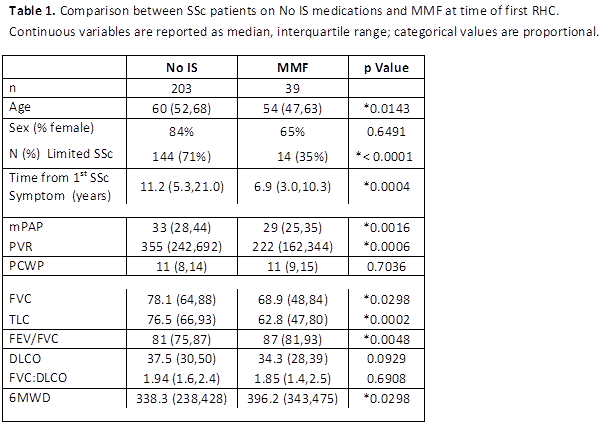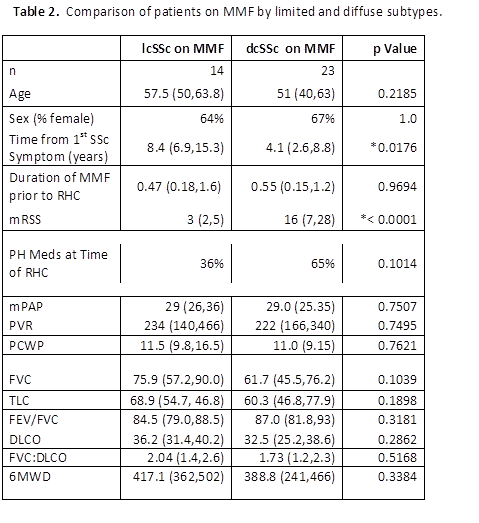Session Information
Title: Systemic Sclerosis, Fibrosing Syndromes, and Raynaud’s - Clinical Aspects and Therapeutics II
Session Type: Abstract Submissions (ACR)
Does Mycophenolate Mofetil (MMF) have an effect on Pulmonary Hemodynamics? Observations from the Pulmonary Hypertension Assessment and Recognition of Outcomes in Scleroderma (PHAROS) Cohort
Background/Purpose: Systemic sclerosis (SSc) related pulmonary hypertension (PH) carries a high mortality; with SSc pulmonary arterial hypertension (PAH) having a 4x higher mortality then idiopathic PAH. It is unknown whether immunosuppressant (IS) drugs, particularly mycophenoloate mofetil (MMF), have any effect on vascular remodeling in SSc PH since it has not been formally studied. This analysis looks at the possible effects of MMF in SSc patients who have developed PH.
Methods: PHAROS is a prospective registry designed to provide substantive data to recognize aspects of PH unique to SSc. Patients were stratified by history of MMF or No IS use (no MMF or other immunosuppressant drugs) at the time of the diagnosis of PH by right heart catheterization (RHC). Calculations are derived from non-parametric analyses using Mann-Whitney and Fisher’s Exact as applicable followed by regression analyses.
Results: There were 39 SSc patients who had received MMF (mean duration 0.92 years) and 203 patients receiving No IS prior to diagnosis of PH. Patients treated with MMF when compared to the No IS group, were more likely to be younger, have diffuse SSc and have shorter disease duration. Patients treated with MMF had a significantly lower mean pulmonary artery pressure (mPAP) and pulmonary vascular resistance (PVR) with no difference in pulmonary capillary wedge pressure (PCWP) (Table 1). However, stratified analyses between diffuse and limited SSc patients on MMF revealed no significant differences in mPAP, PVR, PCWP nor in FVC, TLC, FEV/FVC nor DLCO (Table 2). In the group as a whole, MMF (p=0.046) and SSc subtype (p=0.01) were the only independent determinants of mPAP when adjusted for differences in age, FVC and disease duration.
Conclusion: Patients treated with MMF compared to the No IS group had lower mPAP and PVR at time of the diagnosis of PH with no difference between groups in PCWP. Differences in mPAP between groups were not explained by differences in age, FVC, or disease duration. These data suggest that MMF could potentially play a role in pulmonary artery remodeling and modifying the severity of PH. These findings warrant prospective controlled investigations of MMF in SSc PH.
Disclosure:
L. A. Saketkoo,
Gilead Pharmaceuticals,
2,
United Therapeutics,
2,
Actelion Pharmaceuticals US,
2;
M. R. Lammi,
None;
J. K. Gordon,
None;
P. Lauto,
None;
V. D. Steen,
Gilead Science, ,
2,
Gilead Science,
5,
Actelion Pharmaceuticals US,
2,
Actelion Pharmaceuticals US,
8,
Roche Pharmaceuticals,
2,
Celgene,
2,
Sanofi-Aventis Pharmaceutical,
2.
« Back to 2013 ACR/ARHP Annual Meeting
ACR Meeting Abstracts - https://acrabstracts.org/abstract/does-mycophenolate-mofetil-mmf-have-an-effect-on-pulmonary-hemodynamics-observations-from-the-pulmonary-hypertension-assessment-and-recognition-of-outcomes-in-scleroderma-pharos-cohort/


